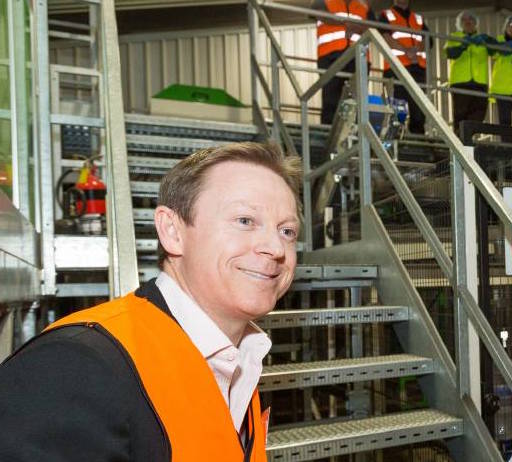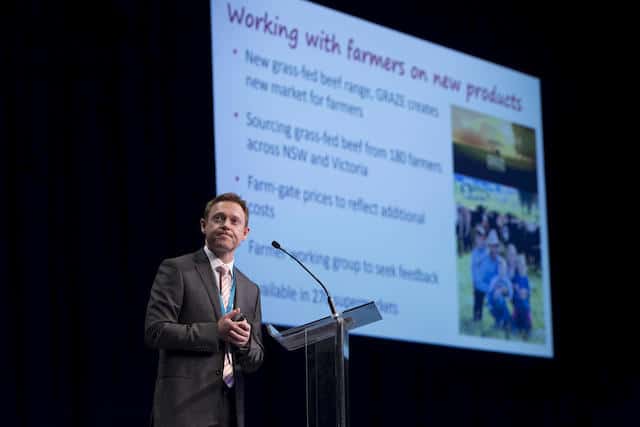In Australia, Coles supermarket has an 80% market share and employs over 100,000 people. Click here to watch an insightful 12 minute video of a presentation Cole’s Brad Gorman made to the AUSVEG conference in August 2015 (with transcript below on this page including timestamps).
Brad Gorman: Good morning everyone. My name is Brad Gorman. I’m the general manager of produce at Coles and I’ve had the absolute pleasure of serving in the fresh produce industry now for the best part of a decade. I’d like to reiterate John’s words and congratulate Richard and his team on putting together what promises to be another wonderful conference. I’d also like to acknowledge Senator Fiona Nash will be joining us later today and John Dollison and I reiterate John’s words in wishing John certainly a speedy recovery and really I want to honour and thank everybody who represents and serves this wonderful industry. So, the title of my talk today is about strategic investment in the fresh food sector and frankly humbly I would suggest that it’s the farmers themselves those bold growers who put their own capital their own endeavour on the line every day who are much better place to talk to you about strategic investment in fresh produce. I have the greatest respect for their efforts I truly value what they do every day and it’s just one of the [01:00] reasons I love this wonderful industry.
Instead I hope to briefly share with you a retailer’s perspective and to give you some sense about how we’re supporting investment in this sector in the sense that maybe it informs the way that you can invest going forward. So firstly, I’d encourage you to invest with the consumer in mind and for our customers that means focusing on quality more than eighty percent of our consumers say that the quality of the fresh food in their supermarket determines where they shop whether they turn left or right when they walk into a shopping centre or whether they walk down a high street.
Fresh food also drives bigger shopping baskets and for that reason it will continue to be important to Coles. So what are our customers actually saying? Not sure all that slides up there but um yeah so what our customers actually saying well the first thing that we’re hearing from them right now is they want to know about provenance they want to know where the food they eat comes from how it’s been growing and how it got to market. [02:00] for that reason innovations and investment in product traceability, the reduction of pesticides and chemical usage will remain important factors.
Convenience too is playing a greater role as time-poor customers been in smaller baskets and more frequently and looking for products that save them time in food production at home so that in turn is encouraging suppliers to invest upstream in value-added production that remains our fastest-growing category. So it’s those factors as John mentioned that have lead calls to change the way that we source product. Six years ago, the vast majority of the product we bought was through intermediaries and market agents and the best we were transactional and in short term in our planning.
Today more than ninety percent of our purchases come from direct supply relationships through long-term and seasonal commitments so that in turn has provided greater transparency and security for our growers and for our customers and I think importantly it helped lower sorry improve returns [03:00] to our growers by removing costs and intermediaries from the supply chain and lastly and that allows us to know where our product comes from how it gets to store and to make sure it’s getting there faster and fresher than ever. So as we’ve built those closer relationships with our growers the other thing that allows us to do is to unlock through shared investment and long-term commitments opportunities to bridge supply gaps and build employment in rural communities to provide better quality and value for Australian consumers.
A great example of this is our relationship with Anthony and Leanne us and their family and their team at berry sweet in Western Australia. So three years ago Anthony and our team identified that there was a significant market gap for the supply of strawberries into WA. Anthony found a parcel of land down in Pemberton in the South of WA and together we’ve developed a 20 hectare production facility that’s bought 60 new jobs to the region and most importantly provided Western Australian consumers with better quality [04:00] and abundant strawberries through early autumn and into winter.
At Coles as John mentioned we also have an Australian first sourcing support and policy. More than ninety six percent of the product we buy comes from Great Australian growers like Andrew moon now I haven’t seen Andrew yet today but what’s brilliant about relationships with innovators like Andrew is that when we come together and work on new varieties and extending in the new growing regions to eliminate imports completely, like to take a moment to share with you the story of Andrew Moon.
Andrew: My name is Andrew Moon and my brother and I run a business called Moon-Rocks. We’re fifth generation farmers. We grow cotton in the granules moon which is based in St George with the centre of the universe. We actually six hours drive west of Brisbane. [05:00]
David Moon: The country in St George is really good for dry onions because of the first of all climate here is great, we have nice [Unclear 05:08 – 05:10] we get drier air which onions love. Also we have nice light soils, we don’t have the heavy clay or the problems associated with heavy clay and other areas.
Andrew: Moon-Rocks employees 15 permanent staff and we also in our peak season which is from October through to January that ramps up to 70 people which starts hauling coal back in 1998 when we were growing melons which since moved out of that silence. We now grow solely onions for Coles and we started supplying onions in 2004.
Dave: We’re also now supplying red onions in a time slot when Coles was actually having to buy those onions from other places because they weren’t available in Australia [06:00]
Andrew: What Coles have done without stopping the import of onions has been not only a brave thing to do but an incredibly good thing to do for our industry. It’s allowed us to put a lot more locally healthy ground product on the market is what the consumer wants I think Carl treated quite well.
Dave: I don’t think that customers realize that 96% of producing at Coles is Australia grown. Customers shopping at Coles can rest assured that they’re always getting the best available produce because it’s coming from Australian farmers.
Andrew: Our business since we’ve been involved with Coles has gone forward it’s been a really good business model. In the last 10 years, we’ve had six fold increase in onion supply to Coles and moving forward I can only see that impressive.
Brad Gorman: So I know that if Andrew ever decides to give up growing onions, he’s definitely got a career [07:00] of head of him on the big screen.
So when we’re talking about investment in the horticultural industry I think we have to acknowledge the rapid technological advancements that are transforming the industry and some exciting examples of that I’m sure will be on show at the trade show earlier this year Coles were delighted to announce our partnership with Sun-Drop farms who we truly believe a leaders in sustainable agriculture they’re using solar power and desalination technology Sun-Drop will be able to grow with incredible resource efficiency providing year-round crop availability consistent quality and they’ll also be able to lower production costs their state-of-the-art greenhouse will bring over 300 jobs to Port Augusta and we’re delighted to have supported that development through a supply agreement that will last for a decade.
Of course technological investment can occur at any scale in Matt hood one of our key suppliers joins us here today Matt and his team at Rugby farms in the Lockyer Valley have invested in state-of-the-art bean saute ssin lines that have improved quality [8:00] and doubled the and the throughput capacity of Matt’s production. These sorts of investments are just critical because they allow Matt to harvest to grade too cool and to pack his fresh beans within three hours and that provides better shelf life and freshness for customers and at the end of the day that’s what it’s all about.
So at Coles, we’re absolutely committed to Australian agriculture, we’re proud to have worked arm in arm with the National Farmers Federation on the packet paddock to plate report on the cost of regulation across our 300 billion dollar fresh food industry. We’ve put in place many to long-term supply agreements not just in horticulture but across industries including in dairy with Devondale Murray Goulburn and with Norco.
We also recognize it’s very important to be fair and to deal fairly with our suppliers. In August last year, we announced our supplier Charter which sets out the protocols we require our buyers to adopt. It’s a formal commitment to deal fairly and transparently with our suppliers and to treat them with respect. [09:00] We have a rigorous dispute settling mechanism, we’ve engaged Jeff Kennett as an independent arbiter who has the power to make rulings that are binding on Coles. We’re also very pleased to have become a signatory to the Australian food and grocery code of conduct now that it’s been ratified by Parliament and we see this is a strong complement to our supplier charter.
We’re also putting in place mechanisms to make sure that we continue to invest in Australian agriculture. Earlier this year down at fresh select, we launched the Coles nurture fund, an allocation of 50 million dollars over five years to encourage suppliers to continue investing to develop market-leading products processes and technologies. Delighted to say that we’ve been inundated with applications through that first round and we look forward to continuing to support the contribution of Great Australian enterprises.
Of course it’s also our role to grow the market John talked about export markets and we welcome export markets because he’ll it helps great Australian growers to grow further but a Deakin University study just a couple of weeks ago [10:00] identified that 95% of Australian adults don’t eat their required intake of fruit and vegetables.
So imagine what opportunity is there if we just unlock and harness that untapped potential to do that we continue to invest in marketing campaigns that leverage trends to greater food cooking in preparation at home and through that we can see continued growth in the Great Australian horticultural sector. To leverage that growth we look forward to continuing to invest in our partnerships with you the most important players in this industry Australian produces and to invest strategically together to grow fresh food across the supply chain. So in closing, I’d just like to thank you for your time today wish you all the very best for the remainder of the convention and just in closing I have a couple of kitchen tips from Andrew and the team at Moon-Rocks. Thank you.
Andrew: As growers and linings, over the years we learnt that there’s a [11:00] few ways to reduce, everyone is putting them in a fridge or freezer prior to cutting, the other one is definitely don’t rub your eyes after cutting the onion and thirdly just eat them whole.


